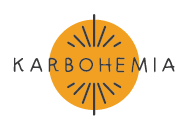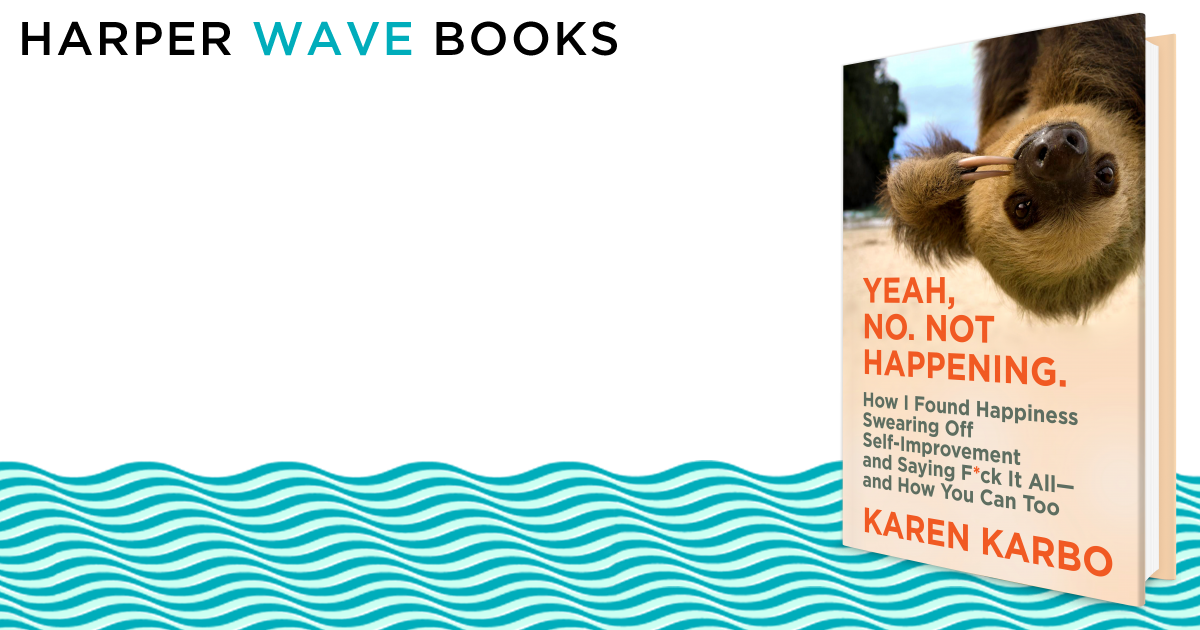On April 8, 2017 author Karen Karbo swore off self-improvement. No more mantras of gratitude, no more diets, no more pretending she was the type of woman who woke up naturally at 6:00 in the morning, ready to work out with a smile on her face. All the work of self-improvement was wearing her down and taking over her life. She took a hard look at the cult of “being your best self” and said Yeah, No. Not Happening. Her one-woman revolution is now a shareable manifesto in YEAH, NO. NOT HAPPENING: How I Found Happiness Swearing Off Self-Improvement and Saying F*ck It All—and How You Can Too (Harper Wave; on-sale 5/5/2020; $26.99; ISBN 9780062945549; 240 pages).
Karbo explores the cultural and societal pressures, marketing and media influences that brainwash women into thinking they must always be improving themselves. From the moment women were cast as “consumers” in the 1920s they were pressured and seduced into buying products to improve not just their lives, but their sense of self-worth. The same type of propaganda that once sold deodorant and Listerine to single women desperate for love are now used to sell complicated skin care systems, flat tummy teas, and regimens that promise to deliver endless happiness to the modern woman. At the heart of “self-improvery” is an underlying message that your own judgment is suspect and that you don’t know what you need.
Karbo says: Learning to say Yeah, No. Not Happening isn’t about giving up on yourself, or health, or beauty. It’s about reclaiming your common sense, and your confidence that you know what works for you and what doesn’t. It’s not about settling for a lesser life, but experiencing more, because you’re no longer captive to the ridiculous, ever-shifting demands pressed on women in the modern world, most of which are expensive, time consuming, not very much fun, and lame. It’s about standing up for yourself, to yourself and to the world.
YEAH, NO. NOT HAPPENING encourages women to think about what they truly want to do with themselves and their lives, and say no to the things that inevitably make them feel like crap including: denying your more complex feelings, especially those considered quote unquote toxic; puritanical dieting; fanatical goal setting; competitive mothering; and believing that productivity and the size of your jeans is the sole measure of your own worth. By saying Yeah, No. Not Happening, women empower themselves to stop trying to “fix” their lives and instead live them with confidence and gusto.
Karen Karbo‘s first novel, Trespassers Welcome Here, was a New York Times’ Notable Book of the Year, and a Village Voice Top Ten Book of the Year. Her other two adult novels, The Diamond Lane and Motherhood Made a Man Out of Me, were also named New York Times’ Notable Books. Karbo’s 2004 memoir, The Stuff of Life, about the last year she spent with her father before his death, was an NYT Notable Book, a People Magazine Critics’ Choice, a Books for a Better Life Award finalist, and a winner of the Oregon Book Award for Creative Non-fiction.
Her short stories, essays, articles and reviews have appeared in Elle, Vogue, Esquire, Outside, O, More, The New Republic, The New York Times, salon.com and other magazines. She is a recipient of a National Endowment for the Arts Fellowship in Fiction, and a winner of the General Electric Younger Writer Award.
Karbo is most well known for her best-selling Kick Ass Women series, including: How to Hepburn (2007), The Gospel According to Coco Chanel (2009), How Georgia Became O’Keeffe (2011), Julia Child Rules (2013).
Her most recent book, In Praise of Difficult Women (2018), was a national bestseller.
Karen grew up in Los Angeles, California and after swearing off self-improvement, moved with her husband and two rescue dogs to a village in the south of France.









Self-Improvement and self-help books help us escape our predicament, and more importantly, they offer wisdom and lessons to help us improve ourselves. Self-Improvement and self-help also help us improve our skills, and of course, provide us with new ones.
To me, self-improvement and self-help are two different things. For people who are suffering, some books, programs, courses, and systems can and do offer genuine help. My experience with self-improvement is that for the most part all it does is make us doubt ourselves, and feel bad about who we are. Also, it should be noted, that some self-improvement books are quite good and some are nonsense. Just like so much else in life.
I am so over the word grateful. Appreciate, respect any other word but grateful the word reminds me of sheep now.